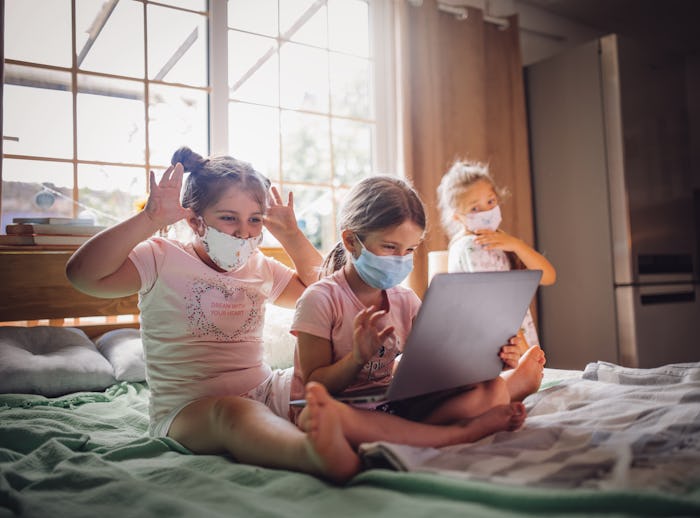Life

Should You Wear A Mask At Home? Experts Say It Depends On Several Factors
As kids prepare to head back to school with the coronavirus pandemic still raging, the nationwide conversation has largely focused on how to prevent transmission of the disease between students and staff — but another, equally pressing concern is the potential transmission between kids and their family members. Some people are beginning to wonder: Should you wear a mask at home? And not just you, but your kids, too?
The answer might vary from family to family, experts say. Kids between the ages of 10 and 19 can spread the virus “at least as well as adults do,” per The New York Times; on the other hand, “studies that show that kids who are under 10 years old seem to be less likely to transmit [the disease] than adults and older adolescents,” Gabriela Andujar Vazquez M.D., an infectious disease physician and associate hospital epidemiologist at Tufts Medical Center, tells Romper. Experts aren't entirely sure why that's the case, she adds.
When it comes to the question of whether adults and kids over the age of 10 should be masking at home, however, expert opinions are mixed (as with so many aspects of the pandemic).
“I think that it does make sense for middle schoolers and high schoolers to mask at home to protect their families,” David Hill M.D., pediatrician, author, and spokesperson for the American Academy of Pediatrics, tells Romper. “We now know that they are just as infectious as adults, although the adults in their homes are more likely to suffer serious and long-term consequences of a COVID infection.” Dr. Hill adds that he currently practices masking in his own household, as do his teenagers.
“We eat meals on the back porch with a fan, but if our teens are in the home and downstairs with us, both they and we are masked. Their rooms are on a separate air exchanger, so they don’t mask up there, but if we visit them we do mask,” Dr. Hill tells Romper.
All the back-and-forth from school to home and home to school could pose a new and different risk that we haven’t seen before since many kids haven't been to school since March, Dr. Vazquez says. “With that being said, healthcare workers and other essential workers have been back-and-forth from home and work, and it has not become an issue. There’s a difference because there’s universal masking in healthcare settings, but every [workplace and school] should have universal masking,” she says. It’s important to be as safe as possible wherever you are, which means keeping hands clean and sanitized, social distancing when around people outside your immediate "bubble," and yes, wearing masks. But, she adds, it's tricky because “we can’t control what people do at home, especially with their kids.”
Ultimately, you'll have to decide what makes the most sense for your family. What you do might depend on whether or not someone in your household is high-risk, the case count in your area, or what you and your children feel is realistically doable for the long-term. Either way, remember that kids should be handwashing, “especially when they first come home from school, but also prior to contact with other household members,” Dr. Hill tells Romper.
If you think you’re showing symptoms of coronavirus, which include fever, shortness of breath, and cough, call your doctor before going to get tested. If you’re anxious about the virus’s spread in your community, visit the CDC for up-to-date information and resources, or seek out mental health support. You can find all of Romper’s parents + coronavirus coverage here.
Experts:
David Hill M.D., pediatrician, author, and spokesperson for the American Academy of Pediatrics
Gabriela Andujar Vazquez M.D., infectious disease physician and associate hospital epidemiologist at Tufts Medical Center
This article was originally published on